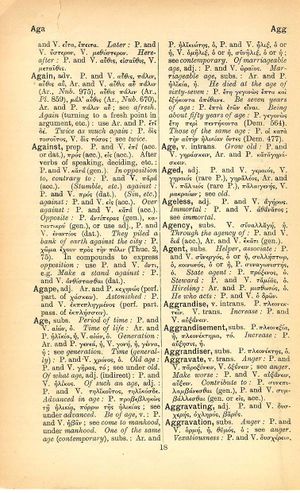agape: Difference between revisions
From LSJ
κινδυνεύει μὲν γὰρ ἡμῶν οὐδέτερος οὐδὲν καλὸν κἀγαθὸν εἰδέναι, ἀλλ᾽ οὗτος μὲν οἴεταί τι εἰδέναι οὐκ εἰδώς, ἐγὼ δέ, ὥσπερ οὖν οὐκ οἶδα, οὐδὲ οἴομαι· ἔοικα γοῦν τούτου γε σμικρῷ τινι αὐτῷ τούτῳ σοφώτερος εἶναι, ὅτι ἃ μὴ οἶδα οὐδὲ οἴομαι εἰδέναι. → for neither of us appears to know anything great and good; but he fancies he knows something, although he knows nothing; whereas I, as I do not know anything, so I do not fancy I do. In this trifling particular, then, I appear to be wiser than he, because I do not fancy I know what I do not know.
(Woodhouse 2) |
(CSV3) |
||
| Line 1: | Line 1: | ||
{{ | {{Woodhouse1 | ||
| | |Text=[[File:woodhouse_18.jpg|thumb|link={{filepath:woodhouse_18.jpg}}]]'''adj.''' | ||
Ar. and P. κεχηνώς (perf. part. of χάσκειν). | |||
<b class="b2">Astonished</b>: P. and V. ἐκπεπληγμένος (perf. part. pass. of [[ἐκπλήσσω|ἐκπλήσσειν]]). | |||
}} | }} | ||
Revision as of 09:18, 21 July 2017
English > Greek (Woodhouse)
adj.
Ar. and P. κεχηνώς (perf. part. of χάσκειν).
Astonished: P. and V. ἐκπεπληγμένος (perf. part. pass. of ἐκπλήσσειν).

